- Home
- Cormac McCarthy
Blood Meridian, or the Evening Redness in the West Page 14
Blood Meridian, or the Evening Redness in the West Read online
Page 14
Into the mountains - Old Ephraim - A Delaware carried off - The search - Another probate - In the gorge - The ruins - Keet seel - The solerette - Representations and things - The judge tells a story - A mule lost - Mescal pits - Night scene with moon, blossoms, judge - The village - Glanton on the management of animals - The trail out.
They rode on into the mountains and their way took them through high pine forests, wind in the trees, lonely birdcalls. The shoeless mules slaloming through the dry grass and pine needles. In the blue coulees on the north slopes narrow tailings of old snow. They rode up switchbacks through a lonely aspen wood where the fallen leaves lay like golden disclets in the damp black trail. The leaves shifted in a million spangles down the pale corridors and Glanton took one and turned it like a tiny fan by its stem and held it and let it fall and its perfection was not lost on him. They rode through a narrow draw where the leaves were shingled up in ice and they crossed a high saddle at sunset where wild doves were rocketing down the wind and passing through the gap a few feet off the ground, veering wildly among the ponies and dropping off down into the blue gulf below. They rode on into a dark fir forest, the little Spanish ponies sucking at the thin air, and just at dusk as Glanton's horse was clambering over a fallen log a lean blond bear rose up out of the swale on the far side where it had been feeding and looked down at them with dim pig's eyes.
Glanton's horse reared and Glanton flattened himself along the horse's shoulder and drew his pistol. One of the Delawares was next behind him and the horse he rode was falling backward and he was trying to turn it, beating it about the head with his balled fist, and the bear's long muzzle swung toward them in a stunned articulation, amazed beyond reckoning, some foul gobbet dangling from its jaws and its chops dyed red with blood. Glanton fired. The ball struck the bear in the chest and the bear leaned with a strange moan and seized the Delaware and lifted him from the horse. Glanton fired again into the thick ruff of fur forward of the bear's shoulder as it turned and the man dangling from the bear's jaws looked down at them cheek and jowl with the brute and one arm about its neck like some crazed defector in a gesture of defiant camaraderie. All through the woods a bedlam of shouts and the whack of men beating the screaming horses into submission. Glanton cocked the pistol a third time as the bear swung with the indian dangling from its mouth like a doll and passed over him in a sea of honey-colored hair smeared with blood and a reek of carrion and the rooty smell of the creature itself. The shot rose and rose, a small core of metal scurrying toward the distant beltways of matter grinding mutely to the west above them all. Several rifleshots rang out and the beast loped horribly into the forest with his hostage and was lost among the darkening trees.
The Delawares trailed the animal three days while the party moved on. The first day they followed blood and they saw where the thing had rested and where the wounds had stanched and the next day they followed the dragmarks through the duff of a high forest floor and the day after they followed only the faintest trace across a high stone mesa and then nothing. They cut for sign until dark and they slept on the naked flints and the next day they rose and looked out on all that wild and stony country to the north. The bear had carried off their kinsman like some fabled storybook beast and the land had swallowed them up beyond all ransom or reprieve. They caught up their horses and turned back. Nothing moved in that high wilderness save the wind. They did not speak. They were men of another time for all that they bore christian names and they had lived all their lives in a wilderness as had their fathers before them. They'd learnt war by warring, the generations driven from the eastern shore across a continent, from the ashes at Gnadenhutten onto the prairies and across the outlet to the bloodlands of the west. If much in the world were mystery the limits of that world were not, for it was without measure or bound and there were contained within it creatures more horrible yet and men of other colors and beings which no man has looked upon and yet not alien none of it more than were their own hearts alien in them, whatever wilderness contained there and whatever beasts.
They cut the trail of the party early the next day and by nightfall of the day following they had overtaken them. The lost warrior's horse stood saddled in the caballado as they had left it and they took down the bags and divided his estate among them and that man's name was never said again. In the evening the judge came to the fire and sat with them and questioned them and made a map upon the ground and scrutinized it. Then he rose and trod it out with his boots and in the morning all rode on as before.
Their way led now through dwarf oak and ilex and over a stony ground where black trees stood footed in the seams on the slopes. They rode through sunlight and high grass and in the late afternoon they came out upon an escarpment that seemed to rim the known world. Below them in the paling light smoldered the plains of San Agustin stretching away to the northeast, the earth floating off in a long curve silent under looms of smoke from the underground coal deposits burning there a thousand years. The horses picked their way along the rim with care and the riders cast varied glances out upon that ancient and naked land.
In the days to come they would ride up through a country where the rocks would cook the flesh from your hand and where other than rock nothing was. They rode in a narrow enfilade along a trail strewn with the dry round turds of goats and they rode with their faces averted from the rock wall and the bake-oven air which it rebated, the slant black shapes of the mounted men stenciled across the stone with a definition austere and implacable like shapes capable of violating their covenant with the flesh that authored them and continuing autonomous across the naked rock without reference to sun or man or god.
They rode down from this country through a deep gorge, clattering over the stones, rifts of cool blue shade. In the dry sand of the arroyo floor old bones and broken shapes of painted pottery and graven on the rocks above them pictographs of horse and cougar and turtle and the mounted Spaniards helmeted and bucklered and contemptuous of stone and silence and time itself. Lodged in faults and crevices a hundred feet above them were nests of straw and jetsam from old high waters and the riders could hear the mutter of thunder in some nameless distance and they kept watch on the narrow shape of sky overhead for any darkness of impending rain, threading the canyon's close pressed flanks, the dry white rocks of the dead river floor round and smooth as arcane eggs.
That night they camped in the ruins of an older culture deep in the stone mountains, a small valley with a clear run of water and good grass. Dwellings of mud and stone were walled up beneath an overhanging cliff and the valley was traced with the work of old acequias. The loose sand in the valley floor was strewn everywhere with pieces of pottery and blackened bits of wood and it was crossed and recrossed with the tracks of deer and other animals.
The judge walked the ruins at dusk, the old rooms still black with woodsmoke, old flints and broken pottery among the ashes and small dry corncobs. A few rotting wooden ladders yet leaned against the dwelling walls. He roamed through the ruinous kivas picking up small artifacts and he sat upon a high wall and sketched in his book until the light failed.
The moon rose full over the canyon and there was stark silence in the little valley. It may be it was their own shadows kept the coyotes from abroad for there was no sound of them or wind or bird in that place but only the light rill of water running over the sand in the dark below their fires.
The judge all day had made small forays among the rocks of the gorge through which they'd passed and now at the fire he spread part of a wagonsheet on the ground and was sorting out his finds and arranging them before him. In his lap he held the leather ledgerbook and he took up each piece, flint or potsherd or tool of bone, and deftly sketched it into the book. He sketched with a practiced ease and there was no wrinkling of that bald brow or pursing of those oddly childish lips. His fingers traced the impression of old willow wicker on a piece of pottery clay and he put this into his book with nice shadings, an economy of pencil strokes. He is a draftsman as he is other
things, well sufficient to the task. He looks up from time to time at the fire or at his companions in arms or at the night beyond. Lastly he set before him the footpiece from a suit of armor hammered out in a shop in Toledo three centuries before, a small steel tapadero frail and shelled with rot. This the judge sketched in profile and in perspective, citing the dimensions in his neat script, making marginal notes.
Glanton watched him. When he had done he took up the little footguard and turned it in his hand and studied it again and then he crushed it into a ball of foil and pitched it into the fire. He gathered up the other artifacts and cast them also into the fire and he shook out the wagonsheet and folded it away among his possibles together with the notebook. Then he sat with his hands cupped in his lap and he seemed much satisfied with the world, as if his counsel had been sought at its creation.
A Tennessean named Webster had been watching him and he asked the judge what he aimed to do with those notes and sketches and the judge smiled and said that it was his intention to expunge them from the memory of man. Webster smiled and the judge laughed. Webster regarded him with one eye asquint and he said: Well you've been a draftsman somewheres and them pictures is like enough the things themselves. But no man can put all the world in a book. No more than everthing drawed in a book is so.
Well said, Marcus, spoke the judge.
But dont draw me, said Webster. For I dont want in your book.
My book or some other book said the judge. What is to be deviates no jot from the book wherein it's writ. How could it? It would be a false book and a false book is no book at all.
You're a formidable riddler and I'll not match words with ye. Only save my crusted mug from out your ledger there for I'd not have it shown about perhaps to strangers.
The judge smiled. Whether in my book or not, every man is tabernacled in every other and he in exchange and so on in an endless complexity of being and witness to the uttermost edge of the world.
I'll stand for my own witness, said Webster, but by now the others had begun to call to him his conceit, and who would want to see his bloody portrait anyway and would there be fights break out in the great crowds awaiting its unveiling and perhaps they could tar and feather the picture, lacking the article itself. Until the judge raised his hand and called for amnesty and told them that Webster's feelings were of a different kind and not motivated by vanity at all and that he'd once drawn an old Hueco's portrait and unwittingly chained the man to his own likeness. For he could not sleep for fear an enemy might take it and deface it and so like was the portrait that he would not suffer it creased nor anything to touch it and he made a journey across the desert with it to where he'd heard the judge was to be found and he begged his counsel as to how he might preserve the thing and the judge took him deep into the mountains and they buried the portrait in the floor of a cave where it lies yet for aught the judge knew.
When he was done telling this Webster spat and wiped his mouth and eyed the judge again. That man, he said, was no more than a ignorant heathen savage.
That's so, said the judge.
It aint like that with me.
Excellent, said the judge, reaching for his portmanteau. You've no objection to a sketch then?
I'll sit for no portrait, said Webster. But it aint like you said.
The company fell silent. Someone rose to stoke the fire and the moon ascended and grew small over the ruined dwellings and the little stream braided over the sands in the valley floor shone like woven metal and save for the sound it made there was no sound other.
What kind of indians has these here been, Judge?
The judge looked up.
Dead ones I'd say, what about you, Judge?
Not so dead, said the judge.
They was passable masons, I'd say that. These niggers hereabouts now aint no kind.
Not so dead, said the judge. Then he told them another story and it was this story.
In the western country of the Alleghenies some years ago when it was yet a wilderness there was a man who kept a harness shop by the side of the Federal road. He did so because it was his trade and yet he did little of it for there were few travelers in that place. So that he fell into the habit before long of dressing himself as an indian and taking up station a few miles above his shop and waiting there by the roadside to ask whoever should come that way if they would give him money. At this time he had done no person any injury.
One day a certain man came by and the harnessmaker in his beads and feathers stepped from behind his tree and asked this certain man for some coins. He was a young man and he refused and having recognized the harnessmaker for a white man spoke to him in a way that made the harnessmaker ashamed so that he invited the young man to come to his dwelling a few miles distant on the road.
This harnessmaker lived in a bark house he had built and he kept a wife and two children all of whom reckoned the old man mad and were only waiting some chance to escape him and the wild place he'd brought them to. They therefore welcomed the guest and the woman gave him his supper. But while he ate the old man again began to try to wheedle money from him and he said that they were poor as indeed they were and the traveler listened to him and then he took out two coins which like the old man had never seen and the old man took the coins and studied them and showed them to his son and the stranger finished his meal and said to the old man that he might have those coins.
But ingratitude is more common than you might think and the harnessmaker wasnt satisfied and he began to question whether he ought not perhaps to have another such coin for his wife. The traveler pushed back his plate and turned in his chair and gave the old man a lecture and in this lecture the old man heard things he had once known but forgotten and he heard some new things to go with them. The traveler concluded by telling the old man that he was a loss to God and man alike and would remain so until he took his brother into his heart as he would take himself in and he come upon his own person in want in some desert place in the world.
Now as he was concluding this Speech there passed in the road a nigger drawing a funeral hearse for one of his own kind and it was painted pink and the nigger was dressed in clothes of every color like a carnival clown and the young man pointed out this nigger passing in the road and he said that even a black nigger ...
Here the judge paused. He had been looking into the fire and he raised his head and looked around him. His narration was much in the manner of a recital. He had not lost the thread of his tale. He smiled at the listeners about.
Said that even a crazy black nigger was not less than a man among men. And then the old man's son stood up and began an oration himself, pointing out at the road and calling for a place to be made for the nigger. He used those words. That a place be made. Of course by this time the nigger and hearse had passed on from sight.
With this the old man repented all over again and swore that the boy was right and the old woman who was seated by the fire was amazed at all she had heard and when the guest announced that the time had come for his departure she had tears in her eyes and the little girl came out from behind the bed and clung to his clothes.
The old man offered to walk him out the road so as to see him off on his journey and to apprise him of which fork in the road to take and which not for there were scarcely any waysigns in that part of the world.
As they walked out they spoke of life in such a wild place where such people as you saw you saw but one and never again and by and by they came to the fork in the road and here the traveler told the old man that he had come with him far enough and he thanked him and they took their departure each of the other and the stranger went on his way. But the harnessmaker seemed unable to suffer the loss of his company and he called to him and went with him again a little way upon the road. And by and by they came to a place where the road was darkened in a deep wood and in this place the old man killed the traveler. He killed him with a rock and he took his clothes and he took his watch and his money and he buried him in a shallow gra
ve by the side of the road. Then he went home.
On the way he tore his own clothes and bloodied himself with a flint and he told his wife they had been set upon by robbers and the young traveler murdered and him only escaped. She began to cry and after a while she made him take her to the place and she took wild primrose which grew in plenty thereabout and she put it on the stones and she came there many times until she was old.
The harnessmaker lived until his son was grown and never did anyone harm again. As he lay dying he called the son to him and told him what he had done. And the son said that he forgave him if it was his to do so and the old man said that it was his to do so and then he died.
But the boy was not sorry for he was jealous of the dead man and before he went away he visited that place and cast away the rocks and dug up the bones and scattered them in the forest and then he went away. He went away to the west and he himself became a killer of men.
The old woman was still living at the time and she knew none of what had passed and she thought that wild animals had dug the bones and scattered them. Perhaps she did not find all the bones but such as she did she restored to the grave and she covered them up and piled the stones over them and carried flowers to that place as before. When she was an old woman she told people that it was her son buried there and perhaps by that time it was so.
Here the judge looked up and smiled. There was a silence, then all began to shout at once with every kind of disclaimer.
He was no harnessmaker he was a shoemaker and he was cleared of them charges, called one.
And another: He never lived in no wilderness place, he had a shop dead in the center of Cumberland Maryland.
They never knew where them bones come from. The old woman was crazy, known to be so.
That was my brother in that casket and he was a minstrel dancer out of Cincinnati Ohio was shot to death over a woman.
And other protests until the judge raised both hands for silence. Wait now, he said. For there's a rider to the tale. There was a young bride waiting for that traveler with whose bones we are acquainted and she bore a child in her womb that was the traveler's son. Now this son whose father's existence in this world is historical and speculative even before the son has entered it is in a bad way. All his life he carries before him the idol of a perfection to which he can never attain. The father dead has euchered the son out of his patrimony. For it is the death of the father to which the son is entitled and to which he is heir, more so than his goods. He will not hear of the small mean ways that tempered the man in life. He will not see him struggling in follies of his own devising. No. The world which he inherits bears him false witness. He is broken before a frozen god and he will never find his way.

 The Road
The Road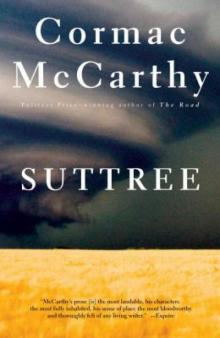 Suttree
Suttree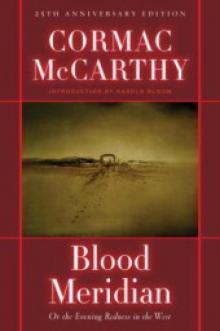 Blood Meridian, or the Evening Redness in the West
Blood Meridian, or the Evening Redness in the West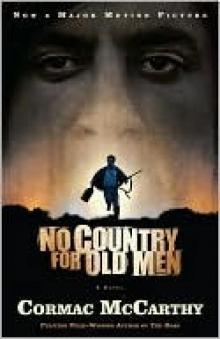 No Country for Old Men
No Country for Old Men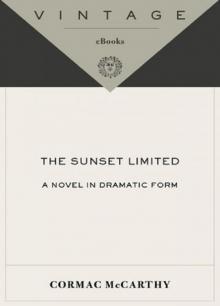 The Sunset Limited
The Sunset Limited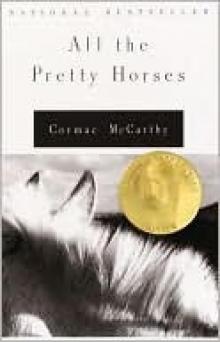 All the Pretty Horses
All the Pretty Horses The Crossing
The Crossing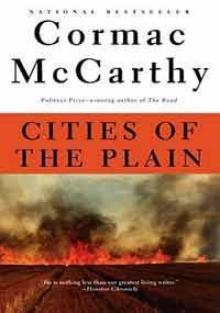 Cities of the Plain
Cities of the Plain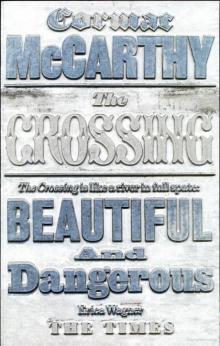 The Crossing tbt-2
The Crossing tbt-2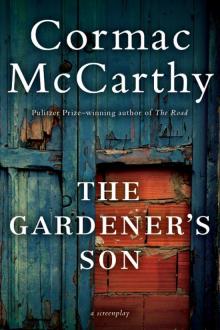 Gardener's Son
Gardener's Son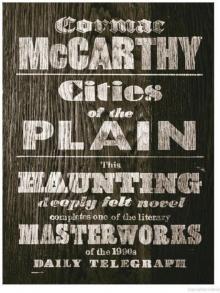 Cities of the Plain tbt-3
Cities of the Plain tbt-3 The Stonemason
The Stonemason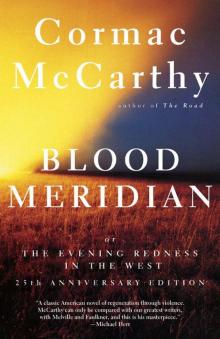 Blood Meridian: Or the Evening Redness in the West (Vintage International)
Blood Meridian: Or the Evening Redness in the West (Vintage International)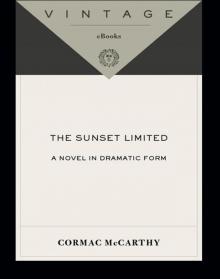 The Sunset Limited: A Novel in Dramatic Form
The Sunset Limited: A Novel in Dramatic Form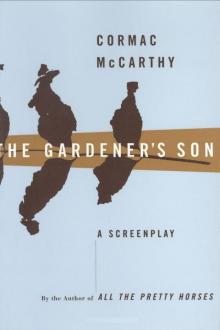 The Gardener's Son
The Gardener's Son